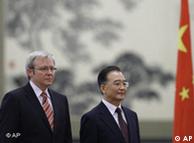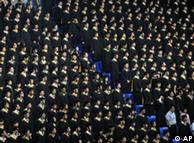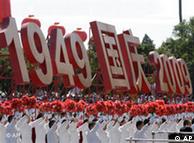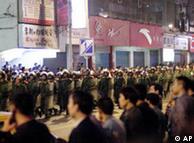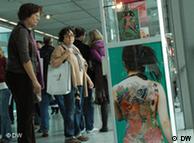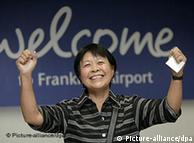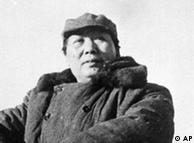China Is Wordless on Traumas of Communists’ Rise
Published: October 1, 2009
CHANGCHUN, China — Unlike in other cities taken by the People’s Liberation Army during China’s civil war, there were no crowds to greet the victors as they made their triumphant march through the streets of this industrial city in the heart of Manchuria.
Skip to next paragraph 
Shiho Fukada for The New York Times
Meng Qinghua said he ate corncobs and bark to survive the famine. More Photos »
Related
Times Topics: China

Shiho Fukada for The New York Times
As a soldier, Wang Junru had to drive back hungry civilians. More Photos >

Shiho Fukada for The New York Times
At least 160,000 civilians died in the Communist siege of Changchun in 1948. Many starved. Zhang Yinghua said the famine killed her siblings and neighbors. More Photos >
Even if relieved to learn that hostilities with Chiang Kai-shek’s Nationalist Army had come to an end, most residents — the ones who had not died during the five-month siege — were simply too weak to go outdoors. “We were just lying in bed starving to death,” said Zhang Yinghua, now 86, as she recalled the famine that claimed the lives of her brother, her sister and most of her neighbors. “We couldn’t even crawl.”
In what China’s history books hail as one of the war’s decisive victories, Mao’s troops starved out the formidable Nationalist garrison that occupied Changchun with nary a shot fired. What the official story line does not reveal is that at least 160,000 civilians also died during the siege of the northeastern city, which lasted from June to October of 1948.
The People’s Republic of China basked in its 60th anniversary on Thursday with jaw-dropping pageantry, but there were no solemn pauses for the lives lost during the Communist Party’s rise to power — not for the estimated tens of millions who died during the civil war, nor the millions of landlords, Nationalist sympathizers and other perceived enemies who were eradicated during Mao’s drive to consolidate power.
“Changchun was like Hiroshima,” wrote Zhang Zhenglu, a lieutenant colonel in the People’s Liberation Army who documented the siege in “White Snow, Red Blood,” a book that was immediately banned after publication in 1989. “The casualties were about the same. Hiroshima took nine seconds; Changchun took five months.”
The 40,000 who survived did so by eating insects, leather belts and, in some cases, the bodies that littered the streets. By the time Communist troops took over the city, every leaf and blade of grass had been consumed during the final desperate months.
There are no monuments or markers recalling the events that decimated Changchun’s populace. Most young people have no knowledge of the darker aspects of the siege, and the survivors, now in their 70s and 80s, are reluctant to give voice to long-buried trauma. “I’ve always heard that Changchun was captured without bloodshed,” Li Jiaqi, a 17-year-old high school student, said as she sat on the steps in front of the city’s Liberation Memorial.
Chinese scholars have largely steered clear of the subject. Several historians, when asked about the episode, declined to be interviewed. Zhou Jiewen, a retired nuclear physicist in Changchun who has become a self-taught expert on the siege, explained that many key details, if widely disseminated, would tarnish the army’s reputation as defenders of the common man. Those include shooting civilians who tried to escape the city and ignoring the pleas of mothers holding aloft starving children on the other side of the barbed-wire barricades. “To cause so many civilians to die was a great blunder by the P.L.A. and tragedy unparalleled in the civil war,” Mr. Zhou said.
While history is often written by the victors, the Communist Party has never been shy about shaping the past to serve its central narrative. Textbooks portray the revolution as the inevitable outcome of a popular uprising; the patriotic films that have flooded television in recent months are not subtle in their glorification of Mao’s troops as munificent liberators. The unpleasant aspects of the revolution, including innocents caught in the cross-fire, are often omitted.
“The party has no use for objective history,” said Bao Pu, a Hong Kong publisher who infuriated party leaders last spring by printing the memoir of Zhao Ziyang, the deposed Communist Party leader who spent 15 years under house arrest after opposing the violent crackdown on democracy protesters in 1989. “The basic idea is that history can be rewritten and used as a tool of the state. But this requires constant censorship. And it has a destructive effect on society.”
Other unintended consequences of suppressing the truth are hard to quantify. Many Chinese, especially those who grew up during the tumultuous decades of war, famine and political persecution, carry psychic wounds that are seldom expressed, let alone healed.
Lung Ying-tai, a University of Hong Kong professor who studied the siege of Changchun, said nearly every elderly army officer she interviewed for her book about the civil war, “Big River, Big Sea — Untold Stories of 1949,” broke down when recounting what he experienced. “It’s an unspeakable national trauma that has not once been opened up and gently treated for 60 years,” she said.
The book, which was published last month in Taiwan and promptly banned on the mainland, seeks to portray the horror of the civil war through the stories of those who survived. “There are not too many left who can clearly remember,” she said.
The elderly survivors who gather in Changchun’s Labor Park most days are not eager to tell their tales. But after some prompting, the details spill out. They describe babies too weak to cry, brides sold for a morsel of food and the milewide no man’s land where thousands perished in full view of troops under orders from Gen. Lin Biao to turn Changchun into a “dead city.”
In the first few months of the siege, food could be purchased, albeit at exorbitant prices. By the end of the summer, people were trading thick gold rings for a biscuit.
“At first we ate rotten sorghum, then corncobs and then the bark off the trees,” said Meng Qinghua, 85. “After a week of not eating you’d get very sleepy. Once that happened, you would start to die.”
The few airdrops of aid, delivered by American planes, were quickly gobbled up by Nationalist troops. When those stopped, the soldiers stole food from civilians at gunpoint. In the poorer quarters of the city, according to “White Snow, Red Blood,” 9 of 10 families were wiped out.
Although her family was relatively well off, Zhang Yinghua said there was nothing to be bought by the end of summer. They opened their pillows and consumed the corn husk filling. Later they boiled and ate leather.
Then 25, Ms. Zhang understood that swallowing such unpalatable matter was the only way to survive. “Every day we would eat a spoonful, just enough to maintain the flicker of life, but the children would not,” she said. When her 6-year-old sister and her 9-year-old brother finally died, her parents, barely able to stand, dragged their bodies to the street.
Some of those charged with enforcing the blockade have come to regret their participation. Wang Junru said he was 15 when the Communists forced him to join a militia for teenagers. Later, he joined 170,000 other soldiers ordered to drive back hungry civilians. “We were told they were the enemy and they had to die,” he said.
Whatever zeal he had for the revolution was extinguished by the 23 years he spent in a labor camp — punishment, he said, for insulting the relative of a party official when he was a college student. After his release, he spent the rest of his working life hauling logs.
Now 76 and embittered, he said young people should learn about what happened in Changchun — and during the rest of the civil war. “They only know the propaganda,” he said. “Maybe if they know how horrible war is, they can try to avoid it in the future.”
Li Bibo contributed research.
